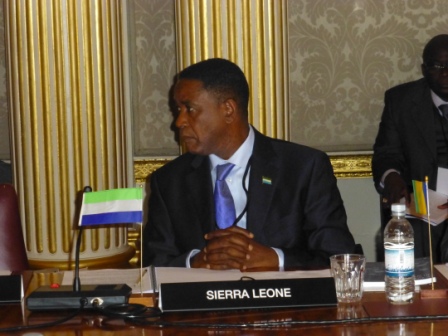That London Mining Lease Agreement Is Illegal!
I am happy, because at long last, London Mining Company Limited, has been given the licence to mine a huge iron ore deposit in the historic Marampa Mines, in the Port Loko District, northern Sierra Leone. It was never an easy task. I therefore say kudos to the Board and Management of London Mining Company Limited, which in my estimation, is supposed to be a credible corporate entity.
As a matter of fact, I was one of those journalists who were in sympathy with London Mining at the time when under the previous political administration, they found it difficult, if not impossible, to secure a mining lease. African Minerals, London Mining’s hot rival, was at the time, stealing the show.
London Mining faced a tougher time under the current administration, more so when the then Minister of Mineral Resources, Alhaji Abu Bakarr Jalloh, was pushing hard for his favoured company, the African Minerals, to have all the iron ore concessions at Marampa and Pepel. It is no news that then Mines Minister, Alhaji Abu Bakarr Jalloh, was a big time beneficiary of African Minerals.
Though steadfast, London Mining became seriously frustrated at one time, and even threatened to pull out…having spent several million United States dollars to sustain its operations during that period of uncertainty. It was really a bullying period for London Mining, and I pitied them so much.
Determined to take over the Marampa mines at all costs, London Mining headquarters in London devised a strategy whereby a number of Sierra Leoneans were recruited to take up key appointments in the company including that of the Managing Director and Public Relations Officer, and also tried to secure a romantic relationship with the new Minister of Mineral Resources and Political Affairs, Alhaji Alpha Kanu – who now uncontrollably serves as the self-proclaimed spokesperson for London Mining.
With the intervention of Alhaji Alpha Kanu, London Mining finally had its way, taking advantage of the global economic slowdown that affected the local economy so badly…leaving the cash-strapped All People’s Congress (APC) government with widely open hands to accept/welcome any investor willing to pump in money into the county’s economy…at least to balance its budget.
Just about that time, the Government of Sierra Leone (GOSL) was embarked on a mission to review all major mining contracts and agreements and at the same time drafting a new mineral act aimed at increasing the benefits the country gets from all minerals exported by mining companies.
Just about that time also, the GOSL went cap in hand in what was dubbed as the London Donor Conference, begging investors to come and invest in the country, proclaiming that “Sierra Leone is open for businessâ€.
London Mining happens to be the first company that entered into a mining lease agreement with the GOSL, under the ‘terms’ of the new Minerals Act of 2009.
As if taking advantage of the situation, London Mining negotiated the agreement in its utmost favour, thereby flouting key terms in the Minerals Act which forms part and parcel of the laws of the land.
Despite concerns raised by civil society activists engaged in advocacy around the issue of just mining in the mining and extractive industry, the Parliament of the Republic of Sierra Leone rushed into ratifying the London Mining lease agreement… without taking cognizance of the numerous flaws in it. That’s how incompetent, irresponsible and unserious our parliamentarians are… in my view.
Precisely, what London Mining achieved at the end was to maximise its profit margin, while limiting its obligations especially in the areas of tax payment and corporate social responsibility.
The first thing that has come out clearly is that the GOSL gave London Mining too much tax concessions, thereby outrightly contravening certain portions of the Minerals Act, which many Sierra Leoneans had thought was drafted to attract more revenue into the economy of the state. It is believed that such ill-thought concessions will profoundly undermine the government’s commitment to ensuring that Sierra Leoneans for the first time benefit from mining.
From the standard tax rate of 37.5 per cent as enshrined in the Income Tax Act 2000 for mining companies, London Mining, in outright disrespect for the provisions of the law, forced the GOSL (the weaker partner in the agreement) to reduce the tax rate for the company to as low as 6 per cent for a lengthy period of ten years.
Also in sharp contrast with the provisions of the Minerals Act which spells out clearly that ‘The holder of a mineral right shall not exercise any of his right in respect of any land dedicated or set apart for any public purpose other than mining including any street, road, highway or aerodrome, except with the written consent of the responsible minister or other authority having control over such land’, the London Mining lease agreement imposed a contrary and perhaps suspicious clause that states that ‘London Mining shall have exclusive right to use, construct, repair and operate within the mining lease area any roads, buildings, plants, structures, living quarters, water supply systems, pipelines, conveyor belts, communications channels, ship loading stations, airstrips, barge channels, storage facilities owned or otherwise possessed by the GOSL and other similar accessory works and installations which are necessary or useful in carrying out operations under this agreement’. Note: emphasis added.
Section 4(a) (ii) allows the company to remove and sell/export any surplus scrap metal not required for the conduct of normal operations situated within the mining lease area, free of any government charges, levies, duties or royalties. There is no such provision in the act, on whose premise the agreement is purported to have been signed.
Section 3(a) of the agreement in question stipulates that ‘The provisions of the Minerals Act relating to mining lease shall apply to the mining lease except to an extent that they are inconsistent with the expressed or any implied terms and conditions of this agreement and the mining lease, in which event the provisions of this agreement and the mining lease will prevail. This is ridiculous because it puts the company above the laws of the land. Of course, there is no such provision in the Minerals Act.      Â
Also important to note is the fact that while the Minerals Act points out clearly that ‘The Director of Mines may, if he deems it necessary, certify that specific items of fixed machinery are necessary for the care and maintenance of the areas covered by the mineral right and such items and machinery shall not be removed’, the almighty London Mining agreement dictates in Section 4(1) that ‘The GOSL will grant any permit and permission for London Mining to export from Sierra Leone any mining machinery, plant equipment, consumable mining store, goods and surplus equipment of whatever description imported for the conduct of its prospecting, mining processing and transport operations contemplated by this agreement’. Note: Emphasis added.
Also ridiculous is that while the Minerals Act made no provision for lack of liability on any mining company, the London Mining agreement states that ‘Nothing in this mining lease, this agreement, the Minerals Act, the Environmental Protection Act or other legislation or regulation shall impose any liability whatsoever on London Mining in respect of any pollution or loss or damage to the environment or the risk thereof, or other claim, where such pollution, loss, damage, risk or claim arises from, or in connection with any acts or omissions in or with respect to the mining lease area prior to the signing of this agreement. This is strange because the Act makes it clear in Section 132(2) that “A holder of a mineral right shall be subject to all laws of the Republic of Sierra Leone concerning the protection of the environment. Besides that, London Mining has been doing some prospecting work in the Marampa general area for the past years, processing the tailings left behind by the previous company that was operating in the area some 35 years ago. In fact nobody knows exactly what happened to the discoveries made as a result of the processing of those vast tailings by London Mining.
Furthering, Section 5(b) of the London Mining agreement states that ‘A royalty of at a rate of 3 per cent of the gross sales price, “free on board†the vessel at the Sierra Leone offshore loading facility for the shipment payable by London Mining in respect of such shipment, after deducting any Sales Tax, Value Added Tax, Goods and Services Tax, Export Duty, Levy or Excise payable to the GOSL…shall be paid to the GOSL. This contravenes the provisions of the Act which makes no mention of “free on boardâ€. Section 148 of the Act spells out that ‘Royalty is payable on the market value of the minerals mined, not after deducting taxes paid. The Act goes on to define market value as the ‘basis for the royalty calculation, as the sale value receivable in an arms length transaction’.
Also, while the Minerals Act in Section 149 provides that the only exemption to paying royalties is in respect to samples of minerals acquired for testing, the London Mining agreement commands that ‘where London Mining is in a cumulative assessable loss position for income tax purposes at the end of any financial year, then it may elect to offset the tax value of such cumulative assessable loss or a part thereof from the liability arising in respect of royalties on turnover payable in terms of this agreement during subsequent years until the tax value of such cumulative assessable loss or part thereof has been exhausted’.
What is even worrisome as contained in the London Mining agreement, is the clause that states that “Notwithstanding the provisions of the Goods and Services Tax Act (2009), London Mining shall be exempt from all Goods and Services Tax levied on such deemed taxable supplies within Sierra Leone and on all imported capital goods, plants, vehicles and equipment, spare and replacement parts for any plant, vehicles and equipment, fuel and lubricants for company and subcontractor use.
With all these blatant alterations, one could safely conclude that while it is a good thing that the Marampa mines is reopening after 35 years in the wilderness, yet the agreement leading to its reopening is illegal to say the lease, because it contravenes the laws of the land, and I am damn displeased and disappointed that the whole country represented by no less a person than His Excellency the President of the Republic of Sierra Leone, Dr. Ernest Bai Koroma and a host of his ministers, all the 125 Members of Parliament, the 149 Paramount Chiefs in the country, all heads of local councils and all the people that matter, converged in Lunsar recently, to celebrate an outright illegality.
My position therefore is that the new Mines and Minerals Act should be reviewed to ensure that agreements signed under its banner are in tune with it. Anything short of that will be deemed illegal, and it is but prudent that the respected British Government takes appropriate steps to ensure that London Mining, which is a UK-based corporate entity, enters into an agreement that is consistent with the Sierra Leonean legislation. By that way, the country will not feel being bullied by an investor that has huge chunk of money at its disposal that a starving nation like ours needs…even at all costs.
See next issue.
By Theophilus S. GbendaStay with Sierra Express Media, for your trusted place in news!
© 2010, https:. All rights reserved.






